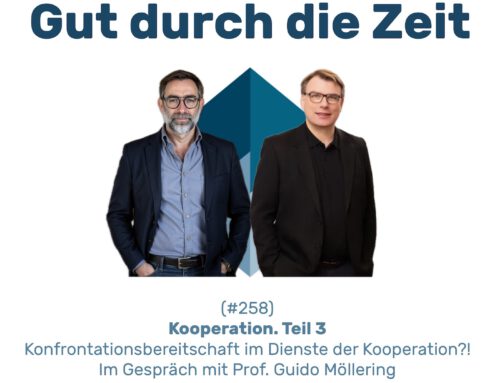INKOVEMA Podcast „Well through time“
#37 – Questions in mediation
Why we shouldn't focus on common ground too early in mediation! In conversation with Ulrike Gamm
Well through time. The podcast about mediation, conflict coaching and organisational consulting.
Ulrike Gamm, Graduate geographer, co-founder of Conflict culture - cultural conflictManagement consultant, international management trainer; associate member of the Faculty of Interdisciplinary Research and Continuing Education (Klagenfurt - Graz - Vienna) at the University of Klagenfurt (IFF)
Summary:
Questions are like searchlights that illuminate a terrain and thus trigger different processes in both the questioner and the interviewee‘ In emotionally charged situations, such as conflicts, people react particularly sensitively to language. Mediators in particular therefore need to pay close attention to the possible effects and not just to the selection and formulation of their respective questions.
Contents:
-
Factors influencing questions in mediation
– Order to the third party
– mental images (maps)
-
Belief polarity model according to Varga Kibéd/Sparrer
– Confidence pole
– Knowledge pool
– Structure and order pole
-
First mediation experience in mediation training
– Inner images of experience guide the questioning process
– Uncertainties at the beginning
– Paradoxical effects of closed questions
– How does co-creation work?
-
Tip for beginners: Self-questioning.
– How am I doing?
– What is the worst that can happen here?
If I want to ask good questions, I have to feel good.
- The mediation setting:
- Both parties to the conflict are present when the mediator asks the questions.
- Don't look for similarities too early and emphasise them.
- Don't ask circular questions too early
- Explain backgrounds, hypotheses when asking questions and thus create transparency
- Successful co-creation
- Give everyone enough space for their own view at the beginning
Why do mediators think that the conflict parties want to tell them their stories?
- Conflicts in organisations
- Role holders sometimes have to endure productive contradictions and cannot agree at all
- Boundaries as a mediator
- We are always operating in terra incognita
Left:
- Ulrike Gamm: www.konfliktkultur.com
- Link to the faith polarity triangle: Insa Sparrer/M. Varga von Kibéd





Leave A Comment